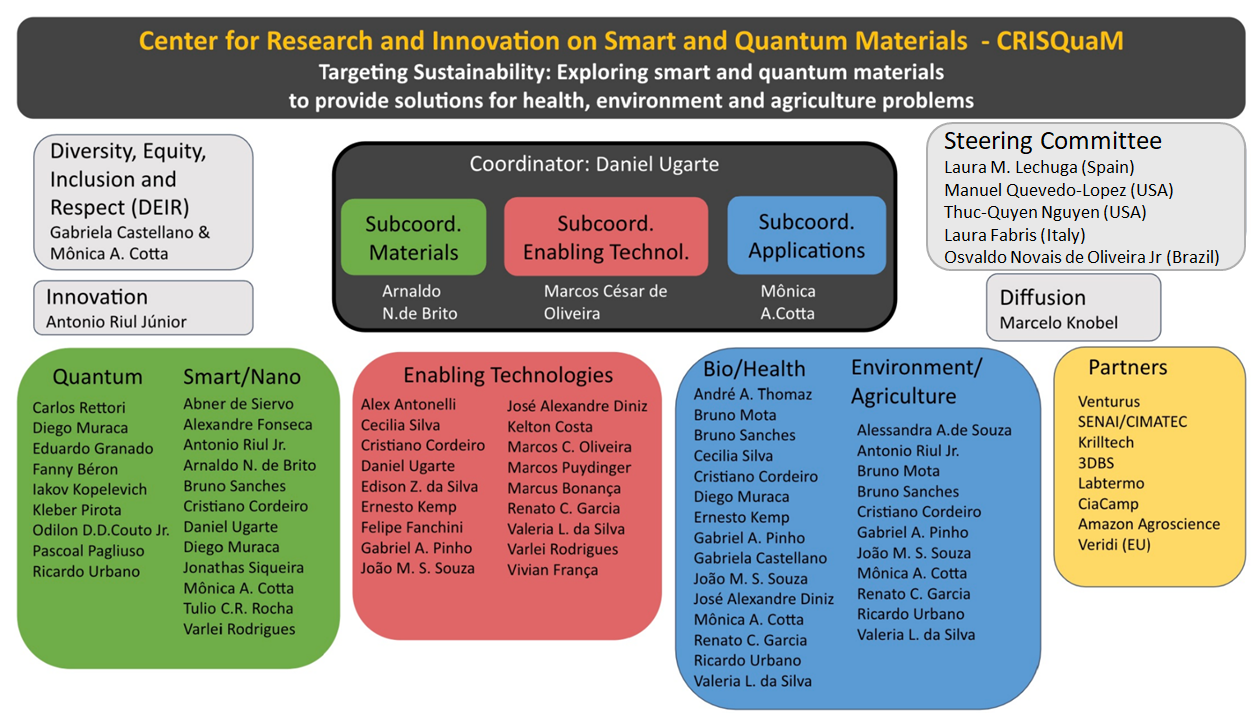BV-FAPESP: research projects supported in this Center
CRISQuaM in the Media: news about the center
CRISQuaM aims to explore the synergistic development of fundamental and applied science to create new materials with high potential for the construction of devices and sensors to address technological challenges related to sustainability, climate change, precision agriculture, ecology, and health. To achieve these goals, we have assembled an interdisciplinary and collaborative research team, integrating expertise across various scientific domains, researching novel materials with high innovation potential. By combining original synthesis methods, advanced characterization techniques, theoretical approaches, computational simulations, quantum technologies, and device construction designs, we aim to drive advances in smart and quantum materials, promoting scientific excellence and technological development. With this, we plan disruptive innovations in instrumentation—including hardware and AI-based tools—as well as in quantum technologies, biomedical devices, and signal processing, in addition to plant bionics, exploring plant-pathogen interactions. Besides research activities, we plan intensive actions in education, dissemination, and communication for the general public, as a modern society should be aware of the challenges humanity faces and how research and technology are essential for responsibly utilizing the planet's limited resources. CRISQuaM's Innovation activities are accelerated through partnerships with several companies in related technologies, many of them Brazilian. Finally, all activities of the Center are managed in accordance with diversity, equity, and inclusion goals and best practices.
The Center brings together scientists, engineers, and innovators in a collaborative effort to apply materials science and quantum technologies at the cutting edge, designing new materials and nano(bio)sensors for advanced diagnostics. The Center has a team capable of producing a wide range of (nano/micro) materials, along with precise chemical and physical characterizations using modern techniques (synchrotron, advanced microscopy, magnetotransport, magnetic resonance, optics, etc.). In addition, the team offers various options in enabling technologies, including miniaturization, processing, and additive manufacturing, as well as instrumentation, quantum sensing, and electronics development. Data analysis will employ updated approaches (numerical simulation, classical and quantum machine learning, and quantum optimization). Applications at the knowledge frontier will address urgent sustainability needs in environmental areas, precision agriculture, plant bionics, and biomedical interfaces, contributing to the development of local technologies in close partnership with the Brazilian industry.
The organization of the Center is based on three pillars — Materials, Enabling Technologies, and Applications — together with partner companies, as described in the figure below.

2025-01-15
Without having had any contact with their parents, piglets fathered by boars housed in cramped conditions for four weeks exhibited elevated levels of cortisol, among other indicators of stress. Offspring of pigs housed in roomier pens and given showers and tactile stimuli coped better with stressful situations.
2025-01-15
Study published in PNAS by researchers from Brazil and the UK shows that primates from the Brazilian semi-arid biome are able to acquire new knowledge as long as their presence is tolerated by other members of the group.
2025-01-15
Foundation launches program aimed at accelerating creation, training human resources and stimulating scientific and technological leadership in the state of São Paulo and Brazil in the field, with potential impacts on sectors such as health, agriculture, communications and computing.
2025-01-15
A study published in Nature Climate Change predicts that 36% of anurans’ habitats worldwide will soon be threatened by a combination of rising temperatures and water scarcity. Brazil has the greatest diversity of anurans in the world and some of the most vulnerable anuran habitats.
2025-01-08
A combination of wireless sensors and artificial intelligence, developed by a FAPESP-supported company, can help companies of different sizes avoid losses due to production interruptions; the startup took part in a business mission during FAPESP Week Spain.
2025-01-08
In a ceremony at the University of São Paulo, which hosts the Center of Excellence in Ocean Innovation and Transformative Technologies, researchers and high officials celebrated a partnership set to foster research on ocean sustainability and fuel public policy.
2025-01-08
Research carried out at the Carbon Neutral Cities CCD, launched by FAPESP and the Technological Research Institute, will develop and apply technologies inspired by nature to increase urban resilience and mitigate greenhouse gas emissions.
2025-01-08
USP is developing the vaccine in partnership with the Vaccine Technology Center at the Federal University of Minas Gerais (UFMG). Permission to conduct a clinical trial is due before the end of this month.